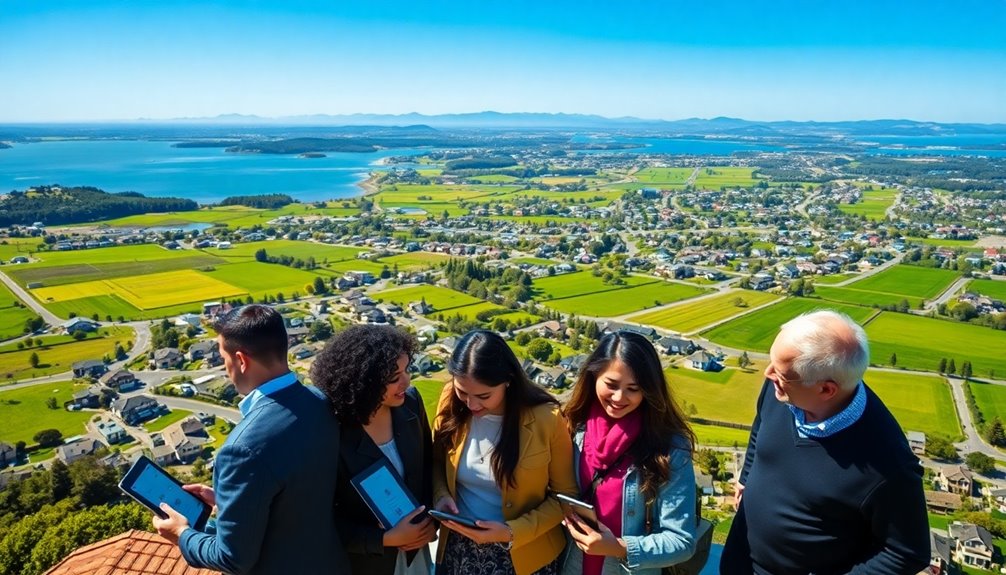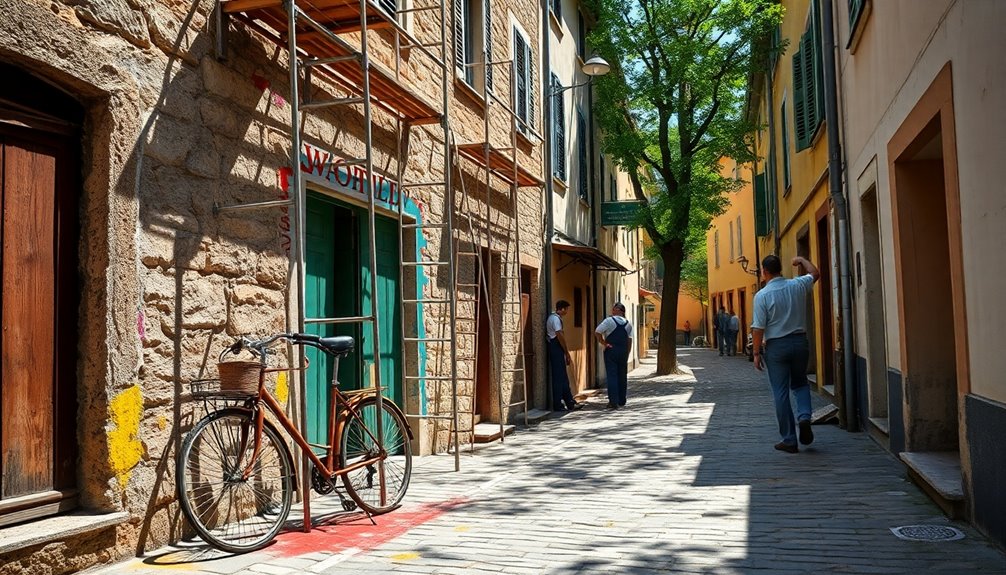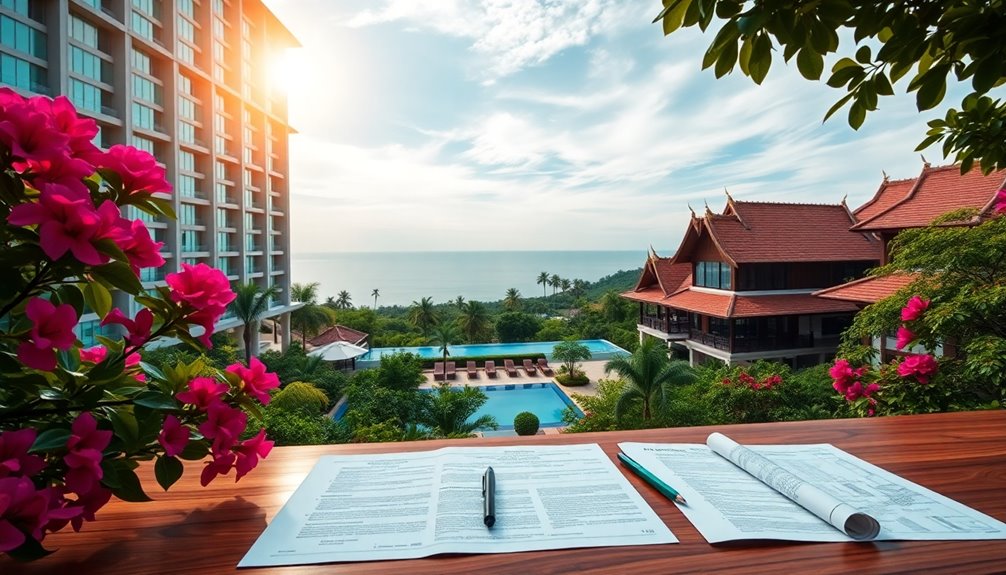When you're choosing the right region for your expat home, climate considerations are essential. Start by evaluating local climate patterns and potential risks, like flooding or extreme heat. Think about your health; humid areas might exacerbate allergies, while extreme temperatures could lead to heat-related issues. Consider your outdoor lifestyle preferences too—temperate climates allow year-round activities. Finally, look into how climate impacts the cost of living and community safety. Each factor plays a role in your comfort and well-being, and exploring these aspects can help you make a more informed choice for your new home.
Key Takeaways
- Evaluate local climate patterns, such as temperature variations and rainfall, to ensure comfort and suitability for outdoor activities year-round.
- Research climate-related risks, including flooding, extreme heat, or wildfires, to assess potential vulnerabilities in your chosen region.
- Consider health impacts of climate, including extreme temperatures and air quality, which may affect respiratory conditions and overall well-being.
- Investigate regions with strong environmental sustainability practices, focusing on renewable energy sources and water conservation efforts.
- Analyze the cost of living and safety concerns in different areas, ensuring a balanced approach to lifestyle and security while relocating.
Understanding Local Climate Patterns

When choosing an expat home, understanding local climate patterns is vital for your comfort and lifestyle. The local climate can greatly affect your daily life, influencing everything from outdoor activities to your overall well-being.
For instance, if you're drawn to regions with Mediterranean climates, you'll enjoy mild, wet winters and hot, dry summers, ideal for those who appreciate temperate weather. On the other hand, tropical climates, like those in Southeast Asia, often come with high humidity and frequent rainfall, which might hinder your outdoor pursuits.
Grasping average temperature ranges is important too. Coastal cities usually boast milder temperatures thanks to oceanic influences, while inland areas can experience extreme heat or cold.
To make informed relocation decisions, access online climate data tools to assess long-term weather trends. This will help you understand rainfall patterns and the number of heat days in different regions.
Evaluating Climate Risks

Evaluating climate risks is essential for ensuring your safety and comfort in your new expat home. Climate risks can vary greatly by region, influencing your livability and long-term satisfaction.
For instance, if you're considering coastal cities like Miami Beach, be aware of increasing flooding and hurricane threats. On the other hand, areas like Tucson, AZ, present extreme heat challenges, with summer temperatures hitting up to 114°F.
To make informed relocation decisions, assess local climate-related threats such as wildfires in California or tornado frequency in the Midwest. It's vital to research these factors to understand your potential vulnerabilities in a new environment.
Utilizing interactive climate maps and reports can provide valuable insights into specific regions, helping you identify safer havens.
For example, parts of the upper Midwest and Northeast, like Buffalo, NY, and Duluth, MN, are recognized as more resilient against climate change impacts.
Assessing Health Impacts

Health impacts are a crucial consideration when choosing your expat home, as various regional factors can greatly affect your well-being. You'll want to evaluate how climate, air quality, and access to healthcare systems influence your health. For instance, extreme temperatures exceeding 100°F can lead to heat-related illnesses. High humidity in tropical climates can worsen respiratory issues, making it essential to reflect on your personal health history.
Additionally, air quality plays a significant role in overall health. Areas with high pollution can lead to cardiovascular problems and respiratory diseases. Seasonal changes, such as long winters or heavy rainy seasons, might also affect your mental health, potentially leading to seasonal affective disorder (SAD). Consuming celery juice during pregnancy has been noted for its potential health benefits, including hydration and essential nutrients.
Here's a quick reference table to help you assess potential health impacts based on various climate factors:
| Climate Factor | Potential Health Impact |
|---|---|
| Extreme Temperatures | Heat-related illnesses |
| High Humidity | Respiratory issues and allergies |
| Poor Air Quality | Increased cardiovascular risks |
Ultimately, verify your chosen region allows for access to outdoor recreational activities, as these are key to maintaining physical and mental well-being.
Outdoor Lifestyle Preferences

When choosing your expat home, think about the outdoor activities you enjoy most and how seasonal climates align with those preferences.
If you love winter sports, a place like Colorado might be perfect, while warm coastal areas can offer year-round surfing and beach fun.
Your ideal region should enhance your outdoor lifestyle, making it easier to pursue the activities you're passionate about.
Preferred Outdoor Activities
If you're someone who thrives on outdoor adventures, finding the right region for your expat home can make all the difference. Contemplate regions with diverse landscapes that cater to your favorite outdoor activities. For hiking, the Pacific Northwest in the U.S. offers stunning trails, while New Zealand is a paradise for snorkeling and water sports.
When moving abroad, you can enhance your experience by choosing areas with temperate climate conditions, like Southern California, which provides year-round opportunities for biking and hiking without extreme weather interruptions.
Additionally, regions with low humidity, such as the high deserts of Arizona, can make outdoor activities during warmer months much more enjoyable.
Access to national parks is another key factor; places like the Rocky Mountains offer extensive trails that allow you to fully immerse yourself in nature.
Don't forget to contemplate local climate conditions, too. For instance, areas like Florida, with milder winters, enable longer seasons for outdoor pursuits compared to regions that experience harsh winters.
Ultimately, selecting the right region can enrich your outdoor lifestyle and make your expat adventure unforgettable.
Seasonal Climate Preferences
Finding the perfect climate for your outdoor lifestyle can greatly enhance your expat experience. If you thrive on outdoor activities, consider settling in temperate climates with mild summers and winters. Regions boasting average annual temperatures between 60°F and 75°F often attract expat communities keen for year-round recreational opportunities.
Extreme temperatures can limit your ability to enjoy hiking, biking, or gardening, so look for areas with seasonal variations that suit your preferences. For avid winter sports enthusiasts, consistent snowfall is essential, while those who love beach and water activities might prefer long, warm summers.
Excessive heat and humidity in tropical climates can hinder your outdoor enjoyment, making locations with lower humidity more appealing for an active lifestyle. Access to natural attractions, such as mountains or coastlines, can also elevate your outdoor experience.
Expats often flock to regions near these features, as they provide ample opportunities for nature-based activities. Additionally, choosing a region with local attractions like regional water parks can enhance your recreational options and family-friendly experiences. By carefully considering your seasonal climate preferences, you'll be better positioned to choose a region that complements your outdoor lifestyle and maximizes your enjoyment while living abroad.
Seasonal Weather Considerations

Understanding seasonal weather variations is vital for expats, as it can have a profound impact on your daily life. If you're considering a region known for harsh winters, prepare for average temperatures well below freezing, which can hinder outdoor activities and complicate transportation.
Conversely, if you choose a tropical climate, be ready for distinct wet and dry seasons, where rainfall can exceed 100 inches annually, affecting your plans and local infrastructure.
It's important to understand local climate patterns, as some areas experience extreme temperature fluctuations. For instance, in Denver, Colorado, summer highs can soar above 90°F, while winter lows may plummet below 20°F.
If you suffer from seasonal allergies, consider how spring pollen counts in regions with abundant flowering plants can greatly affect your comfort.
Additionally, living in coastal regions brings seasonal challenges like hurricanes during late summer and early fall. Being aware of these risks will help you prepare adequately and stay informed about evacuation protocols.
Environmental Sustainability Factors

When picking your expat home, think about regions that prioritize renewable energy sources and effective waste management practices. Consider areas that have invested in eco-friendly infrastructure and are committed to reducing their carbon footprint. Look for places with access to public transportation and a commitment to sustainable living. Once you’ve settled on a location, be sure to research common maintenance and renovation tips to keep your new home environmentally friendly and efficient. This can include things like using energy-efficient appliances, installing solar panels, and finding ways to reduce water consumption. By prioritizing sustainability in your expat home, you can contribute to a greener future for the planet.
You'll want to guarantee the area has strong water conservation efforts, too, as this can impact your daily life.
Renewable Energy Sources
In today's world, choosing a region for your expat home means considering not just lifestyle and culture but also the environmental sustainability of your energy sources. Renewable energy sources like solar, wind, hydro, and geothermal are crucial for reducing greenhouse gas emissions and fighting climate change.
By 2040, solar energy is projected to provide over 20% of the global electricity supply, making it an essential option for your new home.
Countries such as Denmark and Germany are leading the charge with wind energy, which contributed approximately 7.5% of global electricity generation as of 2021.
Hydropower remains the largest renewable source, accounting for about 16% of electricity production, particularly in nations like Brazil and Canada.
If you're considering geothermal energy, the United States is at the forefront, generating over 3,500 megawatts from this sustainable energy source.
Selecting a region that prioritizes these renewable energy sources not only aligns with the goals of international agreements like the Paris Agreement, but it also enhances your commitment to a sustainable lifestyle. Additionally, regions with abundant beach ecosystems often rely on renewable energy to protect their coastal environments.
It's a powerful way to contribute to a healthier planet while enjoying your expat journey.
Waste Management Practices
Effective waste management practices play an essential role in promoting environmental sustainability in your chosen expat region. Countries like Sweden exemplify success, recycling about 99% of their waste while only sending 1% to landfills. You'll want to evaluate regions that prioritize recycling and innovative solutions like composting, which helps divert organic waste from landfills.
Here's a quick overview of some effective practices:
| Practice | Impact |
|---|---|
| Recycling | Up to 65% of municipal waste by 2035 |
| Composting | Over 80% waste diversion in cities like San Francisco |
| Waste-to-Energy | Converts waste into electricity, reducing landfill use |
| Public Awareness | Informed communities engage more in eco-friendly practices |
Regions with strong public awareness campaigns and educational programs encourage residents to participate in recycling and composting initiatives. By choosing a location that emphasizes these waste management practices, you'll contribute to a greener planet and enjoy the benefits of a cleaner, more sustainable environment. Additionally, the integration of sustainable practices such as using certified firewood can further enhance environmental efforts in your new community.
Water Conservation Efforts
Water conservation is crucial, especially in areas grappling with drought. In regions like California, strict regulations require a 25% reduction in water use during severe droughts.
To help you adapt, consider implementing rainwater harvesting systems, which allow you to collect and store rainwater for irrigation and non-potable uses. This greatly reduces your reliance on municipal water supplies.
You might also explore xeriscaping, a landscaping method that uses drought-resistant plants. This approach can cut your outdoor water consumption by up to 50%, making it an effective strategy in water-scarce areas.
Additionally, many cities are investing in advanced irrigation technologies, such as drip irrigation systems, which deliver water directly to the plant's roots. This method can save up to 30% more water compared to traditional irrigation.
Finally, engaging in public awareness campaigns about water-saving practices can also make a difference. Simple actions, like fixing leaks and utilizing water-efficient appliances, have led to a 10-20% reduction in water usage in various urban areas across the United States.
Safety and Security Concerns

When choosing a new expat home, understanding safety and security concerns is essential, as it can greatly impact your quality of life. Evaluating crime rates in potential destinations is vital, as higher crime rates can considerably affect your personal safety. It's wise to research local law enforcement effectiveness and response times to gauge support in emergencies.
| Aspect | Considerations |
|---|---|
| Crime Rates | Review statistics from local authorities to stay informed. |
| Local Law Enforcement | Investigate the responsiveness and reputation of local police. |
| Community Relations | Engage with expat groups to build a support network. |
Cultural attitudes towards safety can also help you navigate your new environment better. Engaging with local communities and expat groups enhances your safety through shared knowledge of safe areas and practices. Regularly reviewing safety statistics keeps you updated on any changes in conditions. This proactive approach to understanding safety and security can help you feel more secure and settled in your new home.
Cost of Living Variations

Cost of living variations can greatly influence your decision on where to settle as an expat. Different regions offer vastly different financial landscapes, which can greatly affect your quality of life.
For instance, if you're eyeing cities like Zurich, be prepared for steep housing costs, with rent prices often soaring. On the flip side, places like Lisbon provide an affordable lifestyle, making it easier on your budget.
Housing costs usually make up the bulk of your expenses. In San Francisco, you might pay around $3,500 for a modest apartment, while in Medellín, you could find similar accommodations for just $500.
Food prices also vary; a meal in Tokyo can set you back $10, whereas in Bangkok, it's only $5.
Transportation costs can add another layer to your budget. In New York City, a monthly public transport pass might cost $120, while in Budapest, it's just $40.
Finally, taxes can greatly impact your financial planning. Germany's tax rates can reach 45%, while Bulgaria offers a flat rate of only 10%. Additionally, understanding the divorce rates in various states can also be a critical factor in your financial considerations when relocating.
Understanding these cost of living variations is essential for making an informed choice about your new home.
Community and Cultural Integration

Finding a vibrant community can make all the difference in your expat experience. Engaging with local expat communities provides crucial support and resources, helping you navigate cultural differences and build essential social networks.
Participating in local cultural events, like festivals and markets, enhances your cultural integration by allowing you to connect with residents and understand local traditions.
Language proficiency greatly impacts your social interactions. By learning the local language, you'll find it easier to connect with neighbors and engage in community activities.
Researching and respecting local customs and social norms will facilitate smoother integration and reduce the likelihood of cultural misunderstandings.
Consider joining clubs or groups that align with your interests, such as sports or arts. These activities can create opportunities for social interaction and deeper community involvement.
The more you immerse yourself in your new environment, the more likely you're to feel at home. Remember, building meaningful relationships in your new community is key to thriving as an expat. Additionally, being aware of parenting resources can be beneficial if you plan to start a family in your new location.
Embrace the journey, and you'll find that cultural integration enriches both your life and the lives of those around you.
Resources for Climate Research

Understanding the climate of your potential new home is essential for making informed relocation decisions. You can tap into various resources to gather crucial climate data and assess climate risks in your chosen area. Here's a quick guide to some useful resources:
| Resource Type | Description |
|---|---|
| Online Climate Platforms | Use sites like ClimateData.org and NOAA for detailed climate data, including average temperatures and precipitation patterns. |
| Interactive Climate Maps | Check out the Climate Resilience Toolkit for maps visualizing risks such as flooding and drought. |
| Historical Weather Data | Explore NOAA's resources for historical weather patterns and future climate projections. |
| Local Government Websites | Review climate action plans and risk assessments that show how regions are preparing for climate change. |
| Community Forums & Expat Groups | Join Facebook or Reddit to engage with expat groups and community forums for firsthand accounts of climate experiences. |
Frequently Asked Questions
How to Choose in Which Country to Live?
To choose the right country to live in, start by evaluating what matters most to you.
Consider factors like cost of living, healthcare quality, and safety. Research local languages and how well you'll be able to communicate.
Look into seasonal changes and average temperatures to find a climate that suits you.
Finally, think about your personal interests and lifestyle to guarantee you'll enjoy your new home.
What Are the Best States to Live in Climate Change?
When thinking about the best states to live in regarding climate change, consider places like Minnesota and Wisconsin, which face fewer natural disasters.
New England states, such as Vermont, offer fresh water and mild climates.
The Pacific Northwest, especially Oregon and Washington, provides a temperate environment with abundant rainfall.
Also, upstate New York and states like Michigan and Maine present lower risks from rising sea levels and have rich natural resources.
Conclusion
In choosing your perfect expat home, don't underestimate the significance of climate considerations. Carefully consider local climate patterns, health impacts, and outdoor opportunities to guarantee a satisfying stay. By balancing safety, security, and community connections, you'll create a cozy, enchanting environment that feels like home. Remember, a well-informed choice leads to a worry-free life abroad. So, dive deep into research and design your dream destination, where every day is a delightful discovery!









